Overview
Wikidata is an open knowledge base hosted by the Wikimedia Foundation that can be read and edited by both humans and machines. Serving as the central repository for structured data used by Wikipedia, Wiktionary, Wikisource, and many other projects. Wikidata has become an indispensable resource in both academic research and industrial applications.
In recent years, the growing body of scholarly publications and practical innovations surrounding Wikidata has underscored its evolving role as the backbone of open structured data. Previous workshops have addressed challenges such as data quality, multilingual contributions, community dynamics, and the evolution of collaborative knowledge graphs. However, in recent years, a new branch of research intersecting Wikidata and GenAI has taken place.
The Wikidata Workshop 2025 expands the last years focus to include emerging trends in artificial intelligence and the transformative impact of Generative AI. This year's workshop welcomes submissions that explore the intersection between Wikidata and LLMs, whether in the context of knowledge base construction/completion, data curation, reasoning, or other novel applications.
This workshop brings together everyone working around Wikidata in both the scientific field and industry to discuss trends and topics around this collaborative knowledge graph.
Call for Papers
Topics
We invite researchers from all domains to show the importance of Wikidata in their fields. Topics of interest include, but are not limited to:
- LLM-Enhanced Knowledge Graph Completion: Investigating how LLMs can be used to automatically extract, refine, and augment Wikidata’s vast collection of facts.
- SPARQL Generation Using LLMs to translate natural language questions into Wikidata-compatible SPARQL queries.
- Automated Fact-Checking and Bias Reduction: Utilizing LLMs for real-time verification of Wikidata statements, addressing issues of misinformation, bias, and consistency within the knowledge graph.
- Multilingual and Cross-Lingual Applications: Exploring the potential of LLMs to lower language barriers by enhancing multilingual data curation, translation, and semantic alignment across diverse linguistic communities.
- Human-AI Collaboration in Knowledge Curation: Designing systems where human editors and intelligent bots work together seamlessly, leveraging LLMs to provide editing suggestions, automated validations, and intelligent data enrichment.
- Ethical and Societal Implications: Discussing the challenges and best practices in merging open knowledge graphs with generative AI, including questions of transparency, data provenance, and the societal impact of AI-driven content generation.
- Data Quality and Validation: Detecting inconsistencies, errors, and biases in Wikidata. As well as approaches to analyze entity similarity.
- Multilingual Knowledge Representation: Improving cross-lingual consistency and translation methods.
- AI and Machine Learning Applications: Using Wikidata to train and validate AI models.
- Community and Governance: Analyzing collaboration, contributor behavior, and data policies.
- Wikidata in the Semantic Web: Enhancing interoperability with linked data and external knowledge graphs.
- Automation and Bots: Developing AI-driven agents for data curation and maintenance.
- Wikidata for Science: Supporting open research, citation networks, and metadata management.
Tracks
This workshop will have two tracks: Novel Work, and Previously Published Work.
Papers in the Novel Work track will be published as part of the workshop proceedings. The Previously Published Work track is for papers already published in other conferences, giving the community the chance to access and discuss relevant work that has been presented elsewhere as part of the workshop.
Novel Work Track
The papers will be double-blind peer-reviewed by up to three researchers. Selected papers will be published on CEUR (unless authors wish to opt out).
For the Novel Work track, we will accept papers up to 12 pages (excluding references, contribution of the paper should justify the length of the paper). We invite the following types of papers:
Previously Published Work Track
Published papers will be reviewed by the organising committee in terms of topical fit and prominence of the publication venue. They will not be published as part of the proceedings.
For the Previously Published Work track, we will accept papers with no page limit, prioritizing instead the importance and relevance of the publication. We invite the following types of papers:
Submission
We ask authors to declare the track they intend on submitting to. To do so, please add, at the beginning of the "title" field on the submission, either the string "[Novel]", for the Novel Work track, or the string "[Published]", for the Previously Published track.
Submission Link: OpenReview
Important Info: Be aware of OpenReview's moderation policy for newly created profiles in the Call for Papers: (1) New profiles created without an institutional email will go through a moderation process that can take up to two weeks; (2) New profiles created with an institutional email will be activated automatically.
Important Dates (all deadlines are 23:59 AoE)
Papers due: Saturday, 02 August 2025 Saturday, 09 August 2025
Notification of accepted papers: Thursday, 28 August 2025 Monday, 01 September 2025
Camera ready papers due: Friday, 12 September 2025 Monday, 17 September 2025
Workshop date: November 2, 2025 in Nara, Japan
Submission Guidelines
Submissions must be as PDF, for the [Novel] track formatted in the style of the CEUR Publications format for CEUR workshop proceedings. A template is available at https://www.overleaf.com/read/pwspggxsbdvy. For the [Published] track, no reformatting of the original PDFs is needed.
Schedule Detail
The workshop runs 09:00 – 17:00 (JST).
All times below in JST.
-
09:00 - 10:30
Session 1: Wikidata as a Knowledge Hub
Session Header -
09:00 - 09:10
Welcome and logistics
Introduction -
09:10 - 09:40
Wikidata as a knowledge base: the opportunity and the challenge
Keynote by Hideaki Takeda -
09:40 - 09:45
Keynote discussion and Q&A
-
09:45 - 10:00
DataQuest: Web Augmentation with Wikidata
Paper presentation -
10:00 - 10:15
Exploring Wikidata as a Global-Scale Knowledge Graph for Human Resource Management
Paper presentation -
10:15 - 10:25
Mini panel Q&A (authors + audience)
-
10:30 - 11:00
Coffee break
-
11:00 - 12:30
Session 2: Ontology Integrity & Robustness on Wikidata
Session Header -
11:00 - 11:30
Finding and Fixing Problems in the Wikidata Ontology
Keynote by Peter F. Patel-Schneider -
11:30 - 11:35
Keynote discussion and Q&A
-
11:35 - 11:50
Benchmarking SPARQL Engines on Wikidata Queries
Paper presentation -
11:50 - 12:05
RoboData: Toward Trustable Question Answering over Ontologies through Metacognitive Agentic Epistemology
Paper presentation -
12:05 - 12:20
LoSA: A Local Structural Approach to Adversarial Attack on the Knowledge Graph-based Question Answering System
Paper presentation -
12:20 - 12:30
Mini panel Q&A (authors + audience)
-
12:30 - 13:30
Lunch Break
-
13:30 - 15:00
Session 3: SPARQL, Datasets & Federation
Session Header -
13:30 - 14:00
QLever and Wikidata
Keynote by Hannah Bast -
14:00 - 14:05
Keynote discussion
-
14:05 - 14:20
Synthetic dataset generation and validation with LLMs for text2sparql in Wikidata graphs
Paper presentation -
14:20 - 14:35
QAWiki: A Knowledge Graph Question Answering & SPARQL Query Generation Dataset for Wikidata
Paper presentation -
14:35 - 14:50
Observations on automated client-side query federation over Wikidata SPARQL endpoints
Paper presentation -
14:50 - 15:00
Mini panel Q&A (authors + audience)
-
15:00 - 15:30
Coffee Break
-
15:30 - 17:00
Session 4: LLMs & KGQA: Reliability and Multilinguality
Session Header -
15:30 - 15:45
Leveraging Knowledge Graphs to Mitigate Counting Hallucinations: A Case Study of Wikidata
Paper presentation -
15:45 - 16:00
KIF-QA: Using Off-the-shelf LLMs to Answer Simple Questions over Heterogeneous Knowledge Bases
Paper presentation -
16:00 - 16:15
MST5 — A Transformers-Based Approach to Multilingual Question Answering over Knowledge Graphs
-
16:15 - 16:25
Mini panel Q&A (authors + audience)
-
16:25 - 16:40
Closing panel / best-paper awards / Q&A
Our Speakers
Peter F. Patel-Schneider
-
Keynote
Finding and Fixing Problems in the Wikidata Ontology
Abstract
Wikidata is a wonderful resource - over one hundred million items, most with significant amounts of data. But working with Wikidata is frustrating due to the many errors in its ontology, which significantly affect many categories and particularly general categories. This talk will discuss efforts that systematically investigated machine-discoverable potential errors in the Wikidata ontology related to disjointness and class order. The goal of the efforts was not just to find the errors but to fix them. It was possible to fix most disjointness errors in the Wikidata Ontology with a very small number of easily found edits. Class order errors proved more resistant to fixing.
Hideaki Takeda
National Institute of Informatics, Japan
Keynote
Wikidata as a knowledge base: the opportunity and the challenge
Abstract
Wikidata is grown up rapidly and now contains over 100 million items. Various databases are connected to Wikidata so that it becomes a "knowledge hub"; the unified entry to databases in the various domains. Although Wikidata has the big opportunity as a knowledge hub, there are some drawbacks as a knowledge base mainly because it consists of both crowd-sourcing effort and systematic input. We here show our attempts to overcome such drawbacks. One is measurement of coverage and consistency in a specific domain. We report it in the medical domain. The other is the analysis of the logical inconsistency and the remedy to recover the logical consistency.
Hannah Bast
University of Freiburg, Germany
Keynote
QLever and Wikidata
Abstract
QLever is an open-source graph database that implements the RDF and SPARQL standards and can load and efficiently query very large datasets, up to half a trillion triples, on a single commodity PC. In this keynote I will talk about a number of recent developments regarding QLever that are interesting and relevant for Wikidata. In particular: a comprehensive performance evaluation of six engines (QLever, Virtuoso, MillenniumDB, GraphDB, Blazegraph, Jena), the incorporation of live updates, and zero-shot question answering with an agentic AI using QLever.
Sessions / Papers
Accepted Papers
-
Benchmarking SPARQL Engines on Wikidata Queries
-
DataQuest: Web Augmentation with Wikidata
-
Exploring Wikidata as a Global-Scale Knowledge Graph for Human Resource Management
-
KIF-QA: Using Off-the-shelf LLMs to Answer Simple Questions over Heterogeneous Knowledge Bases
-
Leveraging Knowledge Graphs to Mitigate Counting Hallucinations: A Case Study of Wikidata
-
LoSA: A Local Structural Approach to Adversarial Attack on the Knowledge Graph-based Question Answering System
-
MST5 — A Transformers-Based Approach to Multilingual Question Answering over Knowledge Graphs -
Observations on automated client-side query federation over Wikidata SPARQL endpoints
-
QAWiki: A Knowledge Graph Question Answering & SPARQL Query Generation Dataset for wikidata
-
RoboData: Toward Trustable Question Answering over Ontologies through Metacognitive Agentic Epistemology
-
Synthetic dataset generation and validation with LLMs for text2sparql in Wikidata graphs

Location
Co-located with ISWC 2025
In Nara, Japan, in-person
Organizing Committee
Joint email: 5th-wikidata-workshop@googlegroups.com
Program Committee
Daniil Dobriy, WU Vienna, Austria
Elmar Kiesling, WU Vienna, Austria
Elton Figueiredo de Souza Soares, IBM Research, Brazil
Fajar Juang Ekaputra, WU Vienna, Austria
Felipe Vargas Rojas, French National Research Institute for Sustainable Development Montpellier, France
Guilherme Augusto Ferreira Lima, IBM Research, Brazil
Hiba Arnaout, TU Darmstadt, Germany
Jairo Francisco de Souza, UFJF, Brazil
Kholoud Saad Alghamdi, King's College London, UK
Leonardo Guerreiro Azevedo, IBM Research, Brazil
Lydia Pintscher, Wikimedia Deutschland
Marcelo Tibau de Vasconcellos Dias, UNIRIO, Brazil
Ruben Taelman, IDLab - Department of Electronics and Information Systems - Ghent University – imec, Belgium
Sandro Rama Fiorini, IBM Research, Brazil
Thomas Pellissier Tanon, Lexistems
Viviane Torres da Silva, IBM Research, Brazil
Wallas Santos, IBM Research, Brazil
Sponsors







